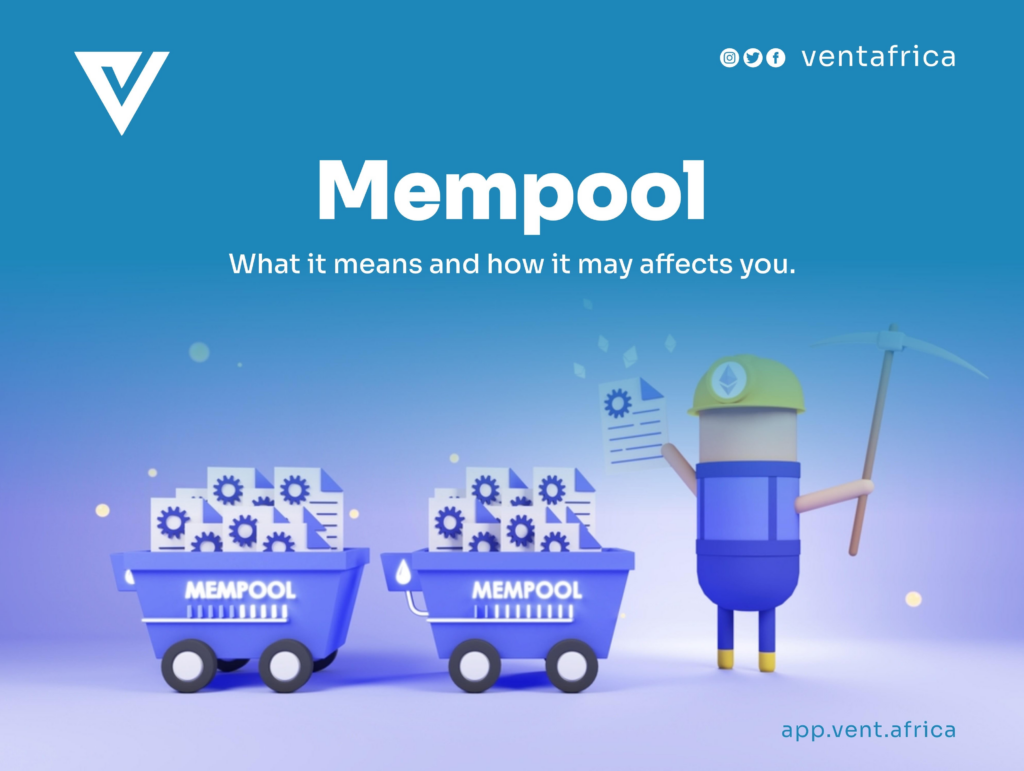Mempool: What it Means and How it may Affect You
Ever heard of the term ‘mempool’?
If you’re a frequent user of BTC, you may have heard the phrase ‘mempool congestion’ get thrown around. And maybe you’ve experienced it yourself. Generally, a Bitcoin transaction is confirmed within one hour. But sometimes, transaction confirmation seems to take forever. Most times, this is caused by mempool congestion.
In this article, we’ll take a look at exactly what mempool is, how it works, and how mempool congestions affect you as a user.

WHAT IS MEMPOOL
A mempool (memory + pool) is a virtual waiting room for pending/unmined transactions on the blockchain. It is the storage area of a node where validated transactions are stored and sorted into an organised queue as they await mining and addition to the blockchain. A mempool holds such transactions until a miner processes them to be added to the next block.
The term ‘mempool’ is primarily used for Bitcoin and the Ethereum network. Some other blockchains have their term for the mempool, such as “transaction pool” or “transaction queue.”
Notably, there is no singular mempool. Every node has its mempool. The mempool typically does not exceed 300 MB in terms of storage capacity.
HOW DOES MEMPOOL WORK?
When a transaction is made, it is usually broadcast to nodes that validate the transaction. If validated, the nodes will broadcast this transaction to all the other connected nodes. Each node will add it to its memory pool and broadcast it to its peers, replicating the transaction across the network.
The mining nodes will add the transactions to a block. Miners then compete to solve the hash of the block. Once a miner succeeds, the block of transactions is added to the chain, and the new block is broadcast back across the network. All the nodes receive the new block, and if they have any of those mined transactions stored in their mempool, they are removed.
HOW DOES MEMPOOL CONGESTION AFFECT YOU?
Normally, transactions move smoothly in and out of the mempool. However, the mempool can become congested on some occasions. This may be due to a high volume of transactions or an abrupt decrease in the trade hash (blockchain mining difficulty). Sometimes, there aren’t enough miners to handle the congestion of the blockchain. This means that some transactions must wait longer for confirmation.
When there is mempool congestion, users usually have the option of paying higher fees to move up the queue. Transactions with lower fees will stay unconfirmed in the mempool until the congestion clears.
Essentially, it will cost you more in terms of network fees to transfer your Bitcoin during a mempool congestion period if you want the transactions to get confirmed quickly.
GOT CRYPTO? WE’VE GOT CASH FOR YOU!
We’ve built a reputable off-ramp platform that makes crypto-to-cash transactions more straightforward, effortless, and secure than ever. Say goodbye to stress, risks and exorbitant fees. With our quick payouts, the best rates and no fees, crypto-to-cash transactions have never been better.
Read more: 5 Reasons to Trade with Vent Africa.

